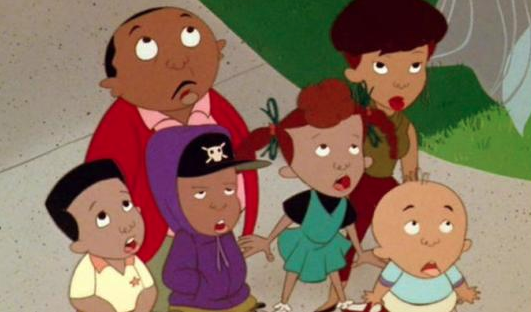Imagine waking up one day and BOOM… you’re responsible for a-whole-nother life. You’re a parent, you have a child — and you can’t change anything about this biological arrangement. It didn’t just happen because you wished upon a star for a child . It didn’t happen because a giant stork chose you to become a parent— it happened because you had unprotected sex (whether it was good or bad sex), and about 40 weeks later… your baby arrived.
Now, I already know what some of you are thinking… and yes some people do make plans to have children. Some people adopt children, some do artificial insemination, and some people choose to become step-parents or legal guardians. The main point is that, whether you’ve planned to become a parent or not — you have entered a territory that requires you to always prepare to expect the unexpected.
Which is EXACTLY why I just can’t understand why everyone is so damn hard on parents!
I mean yes, parents are important. They play a vital role in raising and molding the next generation of adults. They are ‘supposed’ to be the nurturers, the providers, the co-educators, the caretakers… they are ‘supposed’ to be all of these things — BUT who’s ‘supposed’ to show them how to? Correctly? And without judgement?
There is no guide on being a parent, there is no manual, and there is no text book. There’s not even a standardized test that qualifies you to become a parent — there’s no performance test that measures your progress as a parent either.
When it comes to becoming a parent, it is really just a chance — an extremely valuable chance… one that everyone has the chance to FUCK UP!
So again I ask… why is everyone so damn hard on parents?
There is no real way to assess a parent’s job! Where’s the rubric? How do we keep score? What things are subjective? What things aren’t?
As we’re grading parents — do we consider their circumstances, plights, or stressors? I mean sure… Most of us think that we could look at the result of a child and assess the parent’s job.
I guess… but there’s just so much that isn’t being considered!
Do we consider parents’ personal perspectives? Do we consider their childhoods? What about their trauma? Do we consider their personal strengths and their weaknesses? What about the quality of their education? Their level of income? Their upbringing in general? Do we think about the quality of the relationship they have with themselves? What about the quality of the relationships they have with others? What about their home life? Their means of transportation? Their emotional stability? Their work schedule? What about all of the things they go through, the stuff that we don’t always get to see?
What about the nature of their child’s personality? The state of their child’s health? And, mental health?
What about the stages of their child’s cognitive and physical development? What about their child’s triggers? What about their child’s behavior? What about their child’s trauma? What if their child’s trauma was something that the parent couldn’t control or prevent?
What about the child’s other parent? What about the things that just run through bloodline? What if the child’s parents never researched or learned about child development? How will they effectively approach the aspects of parenting and child rearing, that totally catch them off guard?
And another thing… the laws surrounding parenting and child rearing, are as vague as the day is long! We have the Parental Autonomy Doctrine and the Parental Privilege Doctrine, which basically states that parents have the fundamental right to raise his or her child and to make all decisions concerning that child, free from governmental interference.
BUT, we also have something called Child Protective Services! The State could interfere with your parenting when they decide that your child’s health and welfare is being threatened. The state can take your children away from you and place them in foster care — as if their health and welfare can’t be threatened by foster parents.
The reasons why the state can decide to take your children, may very much well be subjective. For example, a parent may choose to utilize spankings to discipline their child. This time, they accidentally left a mark on their child’s skin. Someone could observe it from their own perspective and report the parent’s actions as abuse. The state could follow through with the report by investigating or by removing the child from the parent’s home.
Although there are alternatives to spanking, the parent may have thought that a spanking was the best method for rearing their child. Maybe they received spankings as a child, which worked for them. Maybe they prefer to spank their child because the alternative would be to watch their child get into serious trouble in the future. Maybe they’re frustrated because their child has gotten disciplined for the same behavior numerous times. Maybe spankings are the only form of discipline that makes an impact in their child, due to their child’s personality and mentality.
Would the state consider any of those things before interfering with that parent’s parenting? If the State doesn’t consider these things, wouldn’t that violate the Parental Autonomy Doctrine and the Parental Privilege Doctrine?
One of the most judgmental spaces for a parent, is the child’s school. Schools are filled with adults who are constantly thinking of things parents need to do differently in order for the students to ‘behave better’. Not only that — the law deems school staff ‘mandated reporters’, meaning that they have control over whether or not a parent is reported to the state for negligence.
As a former teacher, I’ve witnessed this first hand. Unfortunately, I had to act as a mandated reporter before… and it tore my heart apart because I had a deep and sincere respect for the parent. But I was reminded that it was my job to report.
I felt like such a traitor for even having to report the incident I witnessed, but under the conditions of the law, what I witnessed was technically a form of neglect. If I would have allowed it to go on without reporting what I saw, I would have been jailed and the child may have continued to be put at risk. Or at least that is how my supervisor told me I had to think about it since I was now a teacher and a mandated reporter— she never even met the parent in question, she didn’t know anything about the family. Yet, the parents were classified as ‘negligent’.
Anyway, there are many teachers and school personnel who are placed in similar predicaments. The title ‘mandated reporter’ affects people differently. Some people go looking for things to report, some people report unnecessary incidents because their cultural competence and personal perspective doesn’t allow them to understand what they are observing or why it may be happening. Others try to evaluate all of the scenario’s components before making a decision that can ultimately have an impact on the lives of someone else’s entire family.
Either way it goes, we are all threatened by the thought of going to jail or indirectly aiding future neglect and abuse. This type of guilt and pressure is enough to create a sense of mistrust between school staff and parents. School staff are reporting ‘negligence’ to maintain job security and freedom. While parents are at their mercy.
Regardless of how the term ‘mandated reporter’ is internalized or practiced by the school staff, any one who has ever worked inside of a school has blamed THE PARENTS for the dysfunction that exists within the school — even if they are a parent.
Now, I’ma be real with all parents for a quick second. Once your kids get to school they do start showin’ out! And they do it for some pretty good reasons… for one, they’re getting a taste of independence and they’re figuring out how to navigate through that. Second, they are surrounded by their peers — so they are simultaneously building their identities while being influenced by peer pressure.
So yeah, it’s very likely that your children will behave differently when they are not in your direct care. Not only that, but school in general seems to be a bit of a joke to most children (we will touch on that topic in another blog post though).
When you mix these factors in with a little bit of ‘you have to spend 6–8 hours here 5 times a week because your parents are at work… and if you don’t come to school the truancy police will be knocking at your parents front door…’ It is much easier to understand why some students choose to misbehave while they’re in school.
Teachers tend to grow irritated because many times, students’ behaviors interfere with the teaching and learning process. When a teacher is unable to execute their job without any distractions — the parents are usually the first to blame.
Teachers and other school personnel blame parents for their children’s willingness to engage in negative behaviors… as if the parent is sitting there telling their child to misbehave and the child doesn’t have a mind of their own.
As educators, our profession encourages us to examine the child’s home life in order to understand more about how to nurture the child’s needs while they are at school. Many times however, the frustration leads us to look into the child’s home life with a sense of judgment and bias — eliminating any real chances for real nurturing. When there are things about the home life that teachers don’t fully understand, we generally blame the parents.
I usually hear the most complaints during report card conferences. Why? Because parents typically don’t show up. Instead of considering some of the reasons why parents aren’t attending these meetings, teachers usually come to the realization or better yet generalization, that most parents just don’t care about their child’s academic progress.
When teachers account for the homework that isn’t being completed, the school supplies that students aren’t prepared with, and the slow rate of academic improvement amongst their students… they start to blame the parents even more.
When teachers examine what type of coats the students have in the winter time, their hygienic practices, or the condition of their clothing… they start to assume things about the student’s home life and wonder why the parent hasn’t made an effort to make a difference yet.
We also notice how entitled students are feeling, how difficult it is for them to name and manage their emotions, and how they struggle with simple tasks such as listening and following directions… we begin to wonder how the child is allowed to behave when they are in their parent’s care. We also wonder if parents are reinforcing these behaviors or striving to reverse them.
We keep track of attendance, we keep track of latenesses, we can tell when students haven’t eaten breakfast — and believe it or not, there are some teachers who actually believe that most of their students don’t have ANY food in their home. I mean zero food, like none.
Most times, that is not the case. But, these are the types of generalizations that are being made about parents on the school level based on how their child shows up in society.
Like I said before, the truancy officers will be knocking at parents’ front door if they chose not to send their children to school — but when they do send them to school, parents can’t help but be judged, talked down to, or compared to ‘better parents’.
Oh yeah, never forgot this keyword… mandated reporters. Always keep that in the back of your mind.
Now check this out, and I really want you all to hear me out… society is way too hard on parents. Society’s generalizations are invalid and I’m gonna show you how.
Take Leon here, for example, most likely his parents will send him off to college. Society will cheer and the parents will feel accomplished. People will congratulate Leon and his parents, and they will comment on all of the wonderful work his parents put in. Most people will assume that Leon’s parents had a parenting style that directly contributed to his success.
And here we have Khalil, who will most likely be classified as a criminal and end up either ‘dead or in jail.’ Society will bash Khalil’s parents claiming that their negligence had a negative impact on his behavior and overall development. People will come up with a list of things Khalil’s parents should have done to prevent him from being at risk. His parents will carry a sense of guilt and shame with them forever, whether they tried their best as parents or not.
The most ironic part about it all, is that there are people with ‘fucked up parents’ in college and there are people with ‘fucked up parents’ behind bars. And, if we were to interview the parents of every college student and every prisoner (even the ‘fucked up parents’) we may come to understand that the majority of these parents tried to do their very best with what they knew and what they had.
The most disturbing part of this entire ordeal is when I witness parents governing other parents. Experienced parents pass judgement on new parents, and vice versa. Old parents pass judgement on young parents, and vice versa. Rich parents pass judgement on poor parents, and vice versa. Educated parents place judgement on uneducated parents, and vice versa.
The minute our child gets into a conflict with another child, we start judging the other child’s parent. We judge the parents of the children we know, and they judge us. We judge each other, in the same way that the state governs us.
We think that our parenting styles and philosophies are better than others because they make more sense to us. We never even consider what makes sense to other parents.
Instead of helping each other grow as parents, we give and receive lots of unwanted advice. We also get defensive and we repel adequate feedback from each other because we subliminally know how hard society is on parents… and we’ve developed a complex about parenting in general. And, we really get ticked off when people call us ‘bad parents.’
This causes many of us to either shut down advice or refrain from giving it when it is necessary. Parents have been judging parents for centuries, and there are so many reasons why this all has to stop!
For one, it literally takes a village to raise a child. All parts of that village should be able to rely on each other and they must all be on the same page so that they can collectively contribute to the rearing of that child. Parents should feel safe with other parents, knowing that we are all holding ourselves and each other accountable. If we have feedback for each other, it should be strictly given to enrich the livelihood of the child, the parent, and their entire family — strengthening the core of the village.
We must all understand that as parents we have each formulated our own philosophies about parenting. Usually our perspectives are shaped by our childhoods, so we must understand that we will all have different approaches to parenting. We will also have different parenting styles, ones that align with our own personalities, identities, and goals as parents. In addition, we are also implementing parenting techniques that were utilized as we were growing up. We are remembering what ‘worked’ and experimenting to see if those very things will work with our children.
So, as you can see, there is really no room for anyone to judge.
The other thing we must all keep in mind is that society seems to also be an opposing force to successful parenting. Society makes parenting hard, and that’s never been a secret — not only does society judge parents, it also makes it nearly impossible for anyone to be an all-around-good-one.
One of the most significant responsibilities as a parent is to ensure that your children have food, clothing, and shelter. All of those things cost money. Obtaining and maintaining all of those things, requires parents to work — long hours, generally 40 hours per week.
Parents also have to have these things organized, prepped, and accessible — so parents usually spend time tending to these things when they are not at work. Children are also ‘at their best’ when they receive 8 hours of sleep, so parents are usually expected to give their children an ‘acceptable’ bedtime. If there are 7 days in each week, and 24 hours in each day, there are 168 hours in each week.
Of those hours, parents and children typically spend at least 40 hours apart, while parents are at work and children are at school — so now we’re down to 128 hours. And, at least 58 of those hours are expected to be dedicated to sleep — so now we’re down to 72 hours and we didn’t even calculate how much time we spend cooking, washing and folding clothes, shopping for the house, keeping the house clean and organized, paying major bills, and getting ourselves prepared for the next day. If I had to make an educated guess, I’d say that the average parent spends at least 30 hours per week doing domestic work — so now we are down to 42 hours per week.
That’s 42 hours to spend quality time with our children — that’s less than 2 whole days — if they do extra curricular activities, that sucks up even more of that time. If you are taking night classes to continue your education, that sucks up even more time. And, if you work more than one job — even more time is spent away from your children.
As much as this interferes with how much time children are able to spend with their parents, it is something that has to be done in order to maintain the stability of the children’s welfare.
As a result, parents are forced to miss out on much needed quality time with their children, they may also accidentally miss some significant stages of their child’s development. They may not be able to cover all of their child’s wants and needs. And, they may not be able to fully assess all of their child’s strengths and weaknesses.
All of these forces are stacked against the parent, and we continue to judge them instead of commending them for not folding.
Society shows us that parenting is a difficult task. Society also shows us that it will make your job as a parent more difficult. Society blatantly shows us that it will judge you if you ‘fuck up.’ And, society also shows us that no matter what you do (good or bad), your children will forge their own paths over time.
Your children will also formulate their own parenting philosophies because they will be critical of your parenting. The same way you were critical of your parent’s parenting — it’s just the name of the game.
Overtime, society has taught me that all parents should detach their emotions from what society ‘thinks’ about parenting and solely focus on the following things.
Being Authentic: nothing is more valuable than a parent who has an authentic personality, a sense of self awareness, and an unwavering confidence. Parents who are authentic in these areas usually focus on maintaining authentic relationships with others and they strive to be extremely transparent with their children. Every parent should focus on becoming their most authentic self so that they can encourage their children to become their most authentic self.
Becoming your best self: along with being authentic, parents should also be honest enough with themselves to assess their personal strengths and weaknesses. Parents should focus on using these self evaluations to implement better strategies in their everyday lives. Parents should also focus on being intentional about changing their lives for the better. They should allow their children to witness their transformations and remain consistent. Especially, if you want to raise children who are motivated to live up to their fullest potential.
Pursuing your dreams: because this will make you happier and it will give you continuous hope. You’ll also be teaching your children how to utilize their interests and talents to manifest an inspiring, full life.
Working really hard at a specific personal goal: because it will help you and your children define the power of determination, diligence, hard work, and success.
Having a social life that doesn’t involve your children at all: parents need to have their own lives outside of their children. Parents need to teach their children how to be good friends, functioning citizens, and philanthropists. What better way to do so, then allowing your children to witness you thriving in social settings, and in community based organizations.
Getting financially stable and increasing your credit score: undergoing the process of becoming financially stable may require parents to educate themselves about financial literacy. This is excellent, because parents can teach their children the fundamentals of financial literacy as you are learning. This will help children better understand money, the importance of credit, and the need for multiple streams of income. It will also prepare them for a more responsible adulthood. As a parent, getting your credit stabilized may also help you increase the chances of living in a better neighborhood or sending your children to better schools.
Figuring out your life purpose and sharpening your world view: this one is vital! When you’ve defined your life’s purpose and you live it, you have something to live for other than your children. You show them how to have something to live for. You defy the odds and you teach them how to do the same. You teach them how to honor their highest self, you actually teach your children how to live — not just survive. When you are able to sharpen your world view by relearning things you already thought you knew, and when you ask questions you never asked before, you open yourself to boundless research and the acquisition of new knowledge. This knowledge can help you make more informed decisions as your parent. It may also help your children better understand their place in the world and how they should function in it. The trick to this one, is really honing in on numbers 1–6!
Being open to learning new things: the willingness to learn new things will help you become a more informed citizen, and it will also help your child engage more in their learning. When you read books that develop you personally and professionally, you learn how to lead a better life. When children see their parents reading for enjoyment, it makes them curious about reading too. When they see you doing research, or making informed arguments about a specific topic — it encourages them to learn to do the same.
Understanding your emotions and managing them well: this one is extremely important because it will help to lower your anxieties and prevent deep depressions. You’ll also communicate better with your child and their other parent. You’ll get better at managing stressful situations, and you’ll be modeling these skills for your children. They’ll naturally develop better coping skills, and they will be able to better handle some of the conflicts they face in their personal lives.
Following this blog: although I’m not a parent yet, I’m an enthusiastic ex-teacher who is always going to be on the parents’ side! So, I’ll be sharing some vital information with you all about the education system and how parents should prepare to navigate it. I’ll also be sharing information about child development so that parents can learn how to effectively create even stronger bonds with their children.
Lamaveriq is the creator of the Parental Guidance Curriculum Textbook and Online Course. This curriculum was constructed to provide parents with home-based coaching that will guide them in educating their children about social emotional intelligences. Increasing parental engagement and involvement is also another one of Lamaveriq’s missions. Through this curriculum, she will provide families with clear cut strategies for developing executive functioning skills and promoting positive youth development.
Stay connected with Lamaveriq, subscribe to The Indigo’s Corner Youtube channel.

















